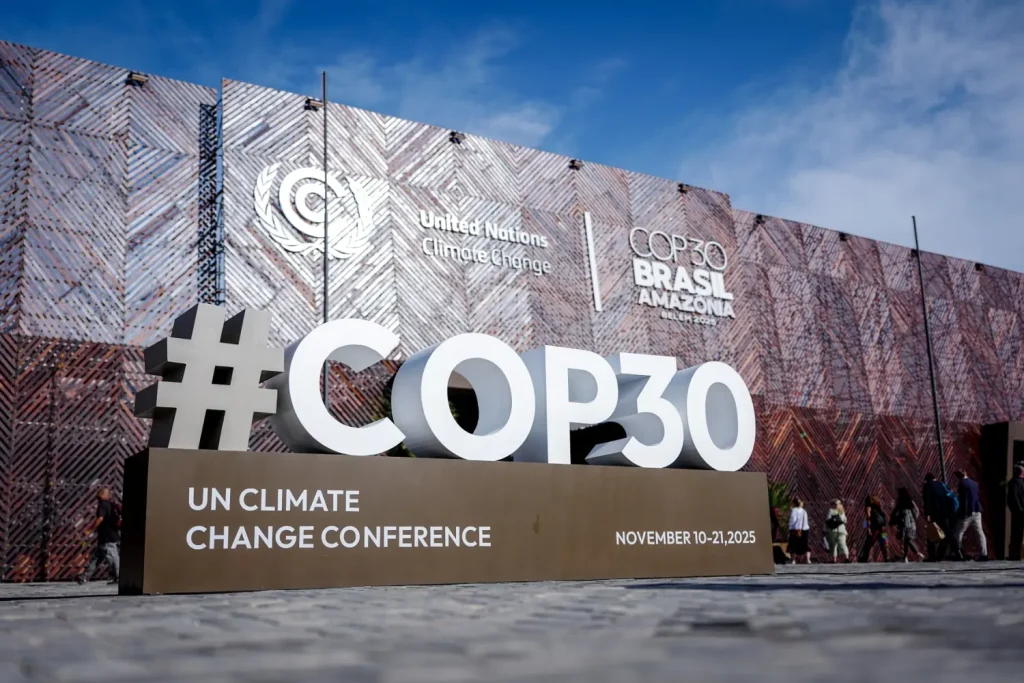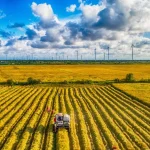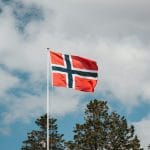COP30: Day 9 Recap

• Seventeen governments joined the Blue NDC Challenge, expanding the integration of ocean action directly into national climate plans.
• A global network of regenerative seascapes launched with a target to mobilize at least USD 20 billion by 2030.
• New nature, adaptation, and ethical governance coalitions advanced cross-sector action on forests, SMEs, and national adaptation plans.
Ocean and Nature Deals Take Center Stage
Belém delivered another day of intense, cross-sector activity as COP30 delegates shifted their focus to ocean systems, nature protection, and community-led climate action. Momentum built early when 17 countries committed to the Blue NDC Challenge, a move that places marine and coastal solutions directly inside national climate plans rather than at their margins. The launch of the One Ocean Partnership added a financial anchor, establishing a global network of regenerative seascapes designed to catalyze at least USD 20 billion for a Regenerative Blue Economy and generate an estimated 20 million jobs.
The day’s agenda was shaped by new implementation tools. The Ocean Breakthroughs Implementation Dashboard and the Marine Biodiversity and Ocean Health toolkit offered clearer accountability pathways for countries and investors tracking progress across marine conservation, shipping, aquatic food, coastal tourism, and clean energy. Several nature-based breakthroughs moved forward as well, with coordinated advances on mangroves, peatlands, and saltmarshes backed by science-based targets and early-stage finance facilities.
At the heart of the action agenda, delegates returned repeatedly to a core premise: implementation must now be designed for real economies, not theoretical frameworks. That tension set the tone for the day.
“In practice, in the real world, we need a basket of solutions. This is what our action agenda is bringing to the table – accelerating a number of solutions. In total, across the six pillars, we have over 114 plans to accelerate solutions that are building on past initiatives created and putting in place plans that bring them together to deliver,” said Bruna Cerqueira, General Coordinator, COP30 Presidency Action Agenda.

Scaling Ocean Action
The Blue NDC Challenge drew attention from negotiators who view ocean systems as an underused climate lever. New commitments were paired with a coordinated Plan to Accelerate Solutions across the five Ocean Breakthroughs: marine conservation, aquatic food, ocean renewable energy, shipping, and coastal tourism.
The One Ocean Partnership launch stood out for its scale. Delegates welcomed its target to mobilize USD 20 billion in regenerative ocean investment by 2030, alongside tools such as the global Implementation Tracker for transparent progress reporting. The Saltmarsh Breakthrough introduced a policy taskforce aimed at restoring 500,000 hectares by 2030, while the Mangrove Breakthrough expanded its financing base through an USD 80 million catalytic facility toward a USD 4 billion goal. A new peatland science framework provided governments and investors with a unified roadmap for high-integrity restoration.
“While ocean-based climate actions are increasingly recognized in NDCs, they remain underfunded and overlooked. The Blue NDC Taskforce will be key to driving ambition and unlocking the ocean’s full climate potential,” said Tom Pickerell, Global Director for the Ocean Program, World Resources Institute.

SMEs, Startups, and South-South Cooperation
Small businesses featured prominently. The Climate-Proofing SMEs Campaign now spans 49 initiatives, supporting nearly 90 million SMEs through mentorship programs, carbon footprint assessments, and ESG capacity-building. More than 250 large companies, including IKEA, Schneider Electric, Tech Mahindra, First Abu Dhabi Bank, and Natura, are working with smaller suppliers on Scope 3 reductions through technical assistance and targeted incentives.
The South-South Collective for Climate (S2C2) gained attention for its ambition to support more than 5,000 climate startups by 2030, targeting potential emissions cuts of up to one gigaton across Africa, Latin America, and South Asia. The initiative plans to support 600 startups by 2027 and mobilize more than USD 220 million in funding. Members have collectively supported over 2,000 climate-tech startups since 2016.
RELATED ARTICLE: COP30: Day 8 Recap
Forests, Synergies, and the Future of Materials
In a notable trilateral alignment, five current and future presidencies of the three Rio Conventions issued a joint declaration to strengthen coordinated action on climate, biodiversity, and land. The effort links the Global Climate Action Agenda, the Riyadh Action Agenda, and initiatives from CBD COP16 in Colombia.
Forest protection and low-carbon materials also moved into focus. Fifteen governments, two local governments, and more than 300 industry partners joined the Principles for Responsible Timber Construction to launch the Building for Forests Acceleration Plan. The coalition aims to engage 30 countries in sustainable wood housing by 2028, expand financing for smallholders and SMEs, and align timber construction with national climate and forest strategies.
Advancing National Adaptation Plans
A major governance initiative emerged with the launch of the National Adaptation Plan Implementation Alliance, led by UNDP, Italy, Germany, and Brazil. The Alliance will coordinate governments, multilateral lenders, investors, insurers, and technical agencies to accelerate implementation of National Adaptation Plans.
“We are not creating a new institution. We are actually co-creating a process, looking into the next 12 months, the climate Weeks and NAP Expo to bring the different entities together and find ways to improve collective action to support the implementation of NAPs. We all want to see Adaptation Plans beyond a paper submitted for the UNFCCC, but as an instrument that guides investment decisions of private and public finance institutions on the ground,” said Alice Amorim, Director of Programs, COP30.

Ethics, Youth, and Indigenous Leadership Drive Global Mobilization
Governance debates shifted toward ethics and cultural foundations during the high-level presentation of the Global Ethical Stocktake (GES) Global Report. Participants—including Marina Silva, Mary Robinson, Michelle Bachelet, Wanjira Mathai, Karenna Gore, and Simon Stiell—emphasized how ethical frameworks can strengthen accountability and guide long-term decision-making. Discussions also explored options for institutionalizing the GES within the UNFCCC process.
Children and Youth Day amplified the voices of young leaders and frontline communities. The Youth Led Climate Forum convened emerging climate advocates, while a parallel session in the Green Zone explored how race, gender, disability, and territory shape climate impacts for young people in Brazil. A recommendations report will inform future youth inclusion.
Indigenous leadership remained central. A session hosted by the Right Energy Partnership with Indigenous Peoples highlighted renewable energy solutions rooted in ancestral knowledge, demonstrating progress on governance, resilience, and local energy access. The People’s Circle convened Indigenous peoples, quilombola groups, coastal women, and youth organizations to discuss climate justice, forest protection, territorial governance, and bioeconomy pathways.
The Global Picture
Across all announcements, Day 9 reinforced a broader message: real-world implementation requires governance clarity, finance aligned to local priorities, and sustained engagement from communities most affected by climate change. Ocean protection, nature restoration, ethical stewardship, and South-South cooperation emerged as unifying threads. Together, they advanced the COP30 objective of turning commitments into tangible outcomes for ecosystems and the people who rely on them.
Follow ESG News on LinkedIn












